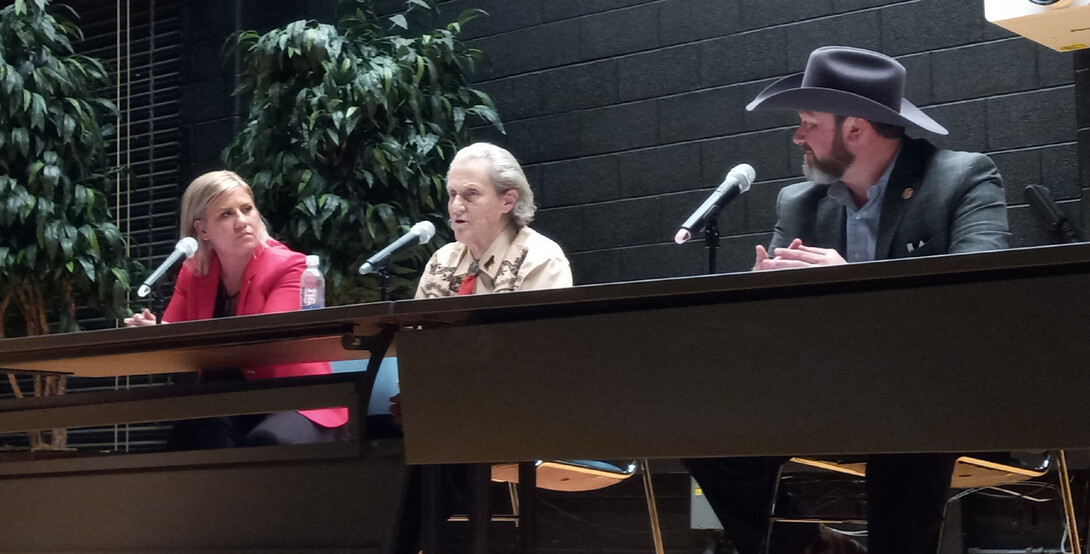A March 13 packed house in the University of Nebraska–Lincoln's Hardin Hall auditorium celebrated the achievements and humanity of groundbreaking animal scientist Temple Grandin with a screening of the new documentary, The film explains how Grandin has transformed the world’s understanding of animal behavior and given hope to autistic young people and their parents.
Through vintage photos and present-day interviews, the film showed how the Temple Grandin of the 1950s — a Massachusetts teenager who endured merciless taunts in high school about her autistic behavior and faced an uncertain future — went on to become an admired animal behavior scientist, academic mentor and advocate for young people too often misunderstood and dismissed.
Just as her mother and other mentors opened doors of life-changing opportunity for Grandin, she has dedicated her life to doing the same for others.
"When I was younger, I used to look for great mysterious meanings of life,” Grandin, a professor of animal science at Colorado State University, said in the film. “When I've gotten older, I thought the most important thing is doing something real to make something better."
One of those who benefited from Grandin’s mentorship is Ruth Woiwode, an assistant professor of animal science at Nebraska who moderated a panel discussion at the conclusion of the Hardin Hall screening.
“When I applied to grad school, I thought Temple wouldn't be able fully to understand my challenge as a single mom, but I couldn't have had a better mentor,” said Woiwode, who earned both her master’s and doctoral degrees from Colorado State under Grandin’s guidance. “She took the time to get to know me and my specific situation, and that has informed my mentorship today.”
“An Open Door” explains how Grandin advanced the understanding of animal behavior by studying it systematically after adopting a groundbreaking change in perspective.
“She imposes the animal's view rather than taking the human view — that's a unique perspective she brings,” said John Festervand, director of development for Colorado State's College of Agricultural Sciences and the film’s executive producer.
When I was younger, I used to look for great mysterious meanings of life. When I've gotten older, I thought the most important thing is doing something real to make something better."
By analyzing feedlots and other facilities from the animals’ vantage point, Grandin revolutionized the understanding of animal behavior, as well as the design of animal enclosures. Half the cattle in the United States are now handled in facilities Grandin designed.
Sometimes an animal might be skittish about going up a ramp. Through her study, Grandin found that the steer isn’t necessarily afraid of the ramp. It’s afraid of a little-noticed shadow, or spooked by the color of a worker’s shirt or the sight of a nearby parked vehicle. Remove those impediments, and the problem is often solved.
During the question-and-answer session, Grandin said that in her late 30s, she became aware that she is a visual thinker rather than a verbal one. If she needs to fix a problem with a machine, she doesn’t want to read detailed printed instructions. She wants to see the machine itself. Then she can get to work fixing it directly.
That realization culminated in her 2024 book, “Visual Thinking: The Hidden Gifts of People Who Think in Pictures, Patterns and Abstractions.” Audience members bought copies of that and other Grandin-authored books before and after the screening.
Schools shouldn’t isolate young people classified as “special needs” but instead should provide them opportunities for activities, such as shop class, that connect to their talents and sensibilities, Grandin said. Society benefits when people with differing thinking approaches are encouraged to work together in complementary fashion.
During the Q&A session, many of the questions were from teachers and parents asking about Grandin’s insights regarding autism. “An Open Door” includes many scenes of Grandin interacting with autistic children, including at a Colorado equine center named after her. There, autistic young people ride horses and get to know the animals. A similar experience greatly helped Grandin as a teenager.
“An Open Door” has been exhibited in more than 60 film festivals and this fall will be available on Amazon Prime and Apple TV+, Festervand said.
Grandin has a large number of proteges now carrying her work forward in academia and industry. At Nebraska’s Klosterman Feedlot Innovation Center, for example, Woiwode is analyzing different cattle handling systems and developing improvements in stockmanship training.
"I hear her voice in what I am now saying to students,” Woiwode said.
She seconded Grandin’s observation that much room remains for further discovery in animal behavior.
“How we best measure animal behavior, what it actually indicates or signals, and therefore how we better manage animals — the opportunities are endless,” Woiwode said.


